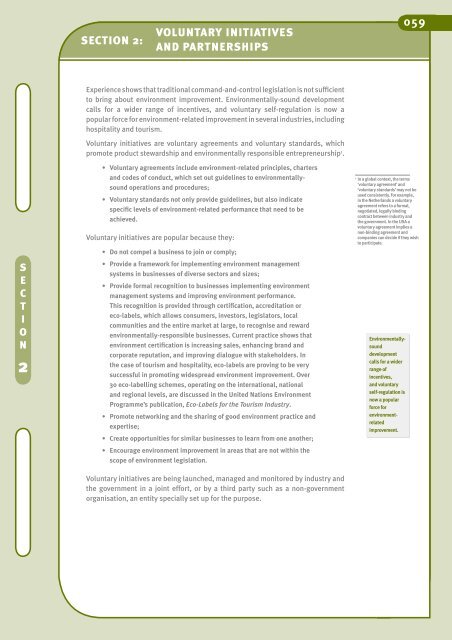Online version: PDF - DTIE
Online version: PDF - DTIE
Online version: PDF - DTIE
You also want an ePaper? Increase the reach of your titles
YUMPU automatically turns print PDFs into web optimized ePapers that Google loves.
SECTION 2:<br />
VOLUNTARY INITIATIVES<br />
AND PARTNERSHIPS<br />
059<br />
S<br />
E<br />
C<br />
T<br />
I<br />
O<br />
N<br />
2<br />
Experience shows that traditional command-and-control legislation is not sufficient<br />
to bring about environment improvement. Environmentally-sound development<br />
calls for a wider range of incentives, and voluntary self-regulation is now a<br />
popular force for environment-related improvement in several industries, including<br />
hospitality and tourism.<br />
Voluntary initiatives are voluntary agreements and voluntary standards, which<br />
promote product stewardship and environmentally responsible entrepreneurship 1 .<br />
• Voluntary agreements include environment-related principles, charters<br />
and codes of conduct, which set out guidelines to environmentallysound<br />
operations and procedures;<br />
• Voluntary standards not only provide guidelines, but also indicate<br />
specific levels of environment-related performance that need to be<br />
achieved.<br />
Voluntary initiatives are popular because they:<br />
• Do not compel a business to join or comply;<br />
• Provide a framework for implementing environment management<br />
systems in businesses of diverse sectors and sizes;<br />
• Provide formal recognition to businesses implementing environment<br />
management systems and improving environment performance.<br />
This recognition is provided through certification, accreditation or<br />
eco-labels, which allows consumers, investors, legislators, local<br />
communities and the entire market at large, to recognise and reward<br />
environmentally-responsible businesses. Current practice shows that<br />
environment certification is increasing sales, enhancing brand and<br />
corporate reputation, and improving dialogue with stakeholders. In<br />
the case of tourism and hospitality, eco-labels are proving to be very<br />
successful in promoting widespread environment improvement. Over<br />
30 eco-labelling schemes, operating on the international, national<br />
and regional levels, are discussed in the United Nations Environment<br />
Programme’s publication, Eco-Labels for the Tourism Industry.<br />
• Promote networking and the sharing of good environment practice and<br />
expertise;<br />
• Create opportunities for similar businesses to learn from one another;<br />
• Encourage environment improvement in areas that are not within the<br />
scope of environment legislation.<br />
Voluntary initiatives are being launched, managed and monitored by industry and<br />
the government in a joint effort, or by a third party such as a non-government<br />
organisation, an entity specially set up for the purpose.<br />
1<br />
In a global context, the terms<br />
‘voluntary agreement’ and<br />
‘voluntary standards’ may not be<br />
used consistently. For example,<br />
in the Netherlands a voluntary<br />
agreement refers to a formal,<br />
negotiated, legally binding<br />
contract between industry and<br />
the government. In the USA a<br />
voluntary agreement implies a<br />
non-binding agreement and<br />
companies can decide if they wish<br />
to participate.<br />
Environmentallysound<br />
development<br />
calls for a wider<br />
range of<br />
incentives,<br />
and voluntary<br />
self-regulation is<br />
now a popular<br />
force for<br />
environmentrelated<br />
improvement.
















